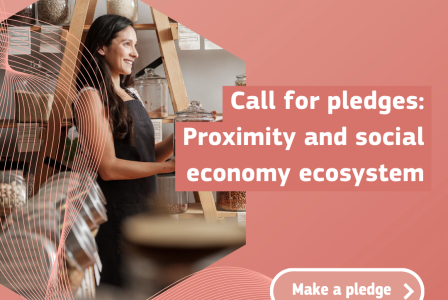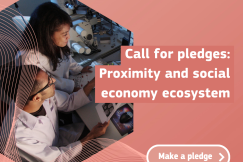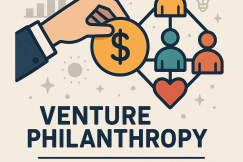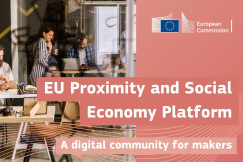Library
23 October 2025
The updated progress report of the proximity and social economy Transition Pathway is out!
Library
23 October 2025
Financing the ecosystem
Partnerships
Regenerative Green Transition
+69 more
Login / create an account to be able to react
-
14

The final edition of the Progress Report on the Transition Pathway for the proximity and social economy is now available. The report analyses over 250 pledges submitted by the PSE ecosystem and presents notable contributions from 4 pledge takers, highlighting the importance of collaboration across different ecosystems. For full insights and findings, we invite you to read the full report.
Ateliere Fara Frontiere
CASES - Cooperativa António Sérgio para a Economia Social
City of Mannheim - Department of Economic Development
Groupe SOS
Topics
Albania
Armenia
Austria
Belgium
Bosnia and Herzegovina
Bulgaria
Croatia
Cyprus
Czechia
Denmark
Estonia
EU-27
Finland
France
Georgia
Germany
Greece
Hungary
Iceland
Ireland
Italy
Kosovo
Latvia
Liechtenstein
Lithuania
Luxembourg
Malta
Moldova
Montenegro
Netherlands
North Macedonia
Norway
Poland
Portugal
Romania
Serbia
Slovakia
Slovenia
Spain
Sweden
Switzerland
Türkiye
Ukraine
Other
Academic / Research and VET Institutions
Business Support Organisation
Company with 250 or more employees
Cluster Organisations
Consumer Organisations
Cultural and Heritage Organisations
Destination Management & Marketing Organisations
EU Institutions
Financial Institutions and Investors
Industry Associations and Chambers of Commerce
International Organisations
Local Authorities
Media / Journalist Organisations
National authorities
Networks and Federations / Confederations
NGOs / Non-profits
Notified Bodies
Regional Authorities
SMEs (a company with less than 250 employees)
Social Economy Entity
Trade Unions
Other
-
Thematic area
-
-
Financing the ecosystem
-
Partnerships
-
Regenerative Green Transition
-
Skills
-
Transformative Digital Transition
-
Urban and Rural Wellbeing
-
Working conditions and governance
-
-
Interlinkages with other sectors
-
-
Proximity and social economy
-
Agri-food
-
Construction
-
Cultural and creative industries
-
Digital
-
Electronics
-
Energy intensive industries
-
Energy-renewables
-
Health
-
Mobility, transport, automotive
-
Retail
-
Textile
-
Tourism
-
Aerospace and defence
-
-
Action areas and keywords
-
-
15-minute city
-
Access to Finance
-
Access to technology
-
Addressing capacity and skills gap
-
Advancing gender equality and safety at work
-
Blue Economy
-
Boosting digital skills by - and in the social economy
-
Buy social
-
Certification, labelling and self-regulation
-
Circular Economy
-
Clusters (including Cluster of social and ecological innovation)
-
Corporate social responsibility (CSR)
-
Creating financial incentives and supportive regulation for green and circular social economy business models
-
Data Maturity and data driven business models
-
Data sharing, Data management & Code of Conduct
-
Digital Platforms
-
Digital social innovation
-
Economic democracy
-
Education
-
Future workplaces
-
Greening infrastructures and business operations
-
Housing
-
ICP rights & workers involvement
-
Industrial relation and social dialogue
-
Innovation
-
Innovation as enabler for green transition and business development in the social economy
-
Internationalisation
-
Local employment
-
Local Green Deals, green business communities and citizens’ initiatives
-
Local Markets
-
Micro mobility
-
New business models
-
New business models – the platform economy
-
New European Bauhaus
-
Other action area
-
Public and private tech partnerships and support
-
Reinforcing Business to Business collaboration for greener and circular value chains
-
Responsible (Public) Procurement
-
Smart mobility
-
Social Finance
-
Socially oriented territorial regeneration
-
Strategy for Data
-
Supporting Digital Social Innovation & Tech for Good entrepreneurship
-
Sustainable Finance
-
Tech for Good
-
-
Ecosystem focus
-
-
Proximity economy
-
Social economy
-
-
Scope of activity
-
-
International
-
Local/neighbourhood
-
National
-
Regional
-
Share
We are pleased to announce the publication of the updated progress report on the Transition Pathway for the proximity and social economy. This is the last part of the reports that serve as a vital resource for stakeholders, including policy makers, social economy practitioners, and researchers, providing essential insights into the pledges submitted until 1 June 2025, and highlighting the contributions and synergies across ecosystems.
The key findings of the report
Since the first ‘Call for Pledges’ in November 2022, 259 pledges have been submitted to the Transition Pathway for proximity and social economy.
From an analysis of the commitments submitted, most are associated with initiatives linked to the green transition (59%), while 35% are focused on the digital transition. In particular, most initiatives focus on the following objectives: addressing capacity and skills gaps, implementing innovation related to the green transition, and strengthening business-to-business collaborations.
The report underscores the need for greater focus and attention for actors in the PSE ecosystem towards digital innovation. In particular, the results suggest that specific aspects of the digital transition, such as technology access, data maturity and data-driven models, as well as data sharing, management, and adherence to the codes of conduct, present opportunities for further enhancement. The recently published Code of Conduct for Data Sharing in the Social Economy can inspire and encourage stakeholders to implement more actions in this area.
Regarding the types of stakeholders who have pledged more frequently, social economy entities contributed the highest number of pledges (94), followed by EU networks (59), and business support organisations (34). It is noteworthy that 14 organisations submitted six or more pledges, with Strasbourg (city and Eurometropole) and their partners distinguished by a total of 13 submissions.
Geographically, most pledges were made by stakeholders active at the EU level (50), corresponding to 19% of total submissions. Italian actors contributed with 41 pledges, followed by French and Spanish ones (respectively 40 and 32 pledges).
The report deep-dives into the specific contributions made by Groupe SOS, City of Mannheim, Ateliere Fără Frontiere, and CASES. These case studies underscore the significance of fostering synergies within the ecosystem. Additionally, the report draws attention to the interactions with other ecosystems, thereby reinforcing the potential of the PSE ecosystem for cross-sectoral collaboration.
We invite you to read the full Progress Report attached below to get more detailed insights and findings.
Documents
Comments (0)
Related content
See also
The evolution of philanthropy: from traditional giving to Venture Philanthropy and Impact-Driven Investment
- Categories
- Partnerships Regenerative Green Transition Skills +68 more
European Social Economy Awards 2025
- Categories
- Partnerships Regenerative Green Transition Skills +67 more
We are packing up! Proximity and social economy community is moving
- Categories
- Partnerships Regenerative Green Transition Skills +68 more




